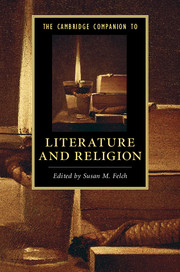8 - Repetition
from PART II - INTERSECTIONS
Published online by Cambridge University Press: 05 September 2016
Summary
How might we bring together the study of religion and literature? How ought (or oughtn't) we to conjoin these ways of making, finding, and thinking about meaning? For some, the simple fact that religion and literature intertwine in particular historical periods and cultures demands that they be studied in connection with each other. For others, literature provides an occasion for speculative religious thought, whereby literary texts are used to think about religious questions. Conversely, religious texts may be read with attention to their literary forms. But we might also think about religion and literature through their many points of convergence, allowing each area its integrity while bringing religion and literature into relation through traits, habits, practices, and qualities central to each. In the ways Western religion and literature are configured, those points of convergence include canon, belief (or disbelief), form, genre, ritual, and ways of relating to tradition and to authority.
Repetition is especially promising as a point of convergence. It is central to many areas of religious thought and practice. Repetitive prayer features in Western and non-Western religious practices, and repetition structures and motivates religious ritual. Ritual may both recall – by remembering an earlier event – and, in many traditions, reenact – by making earlier events present again to the community ritually performing them. Repetition is related to exemplarity, in that particular instances – of sanctity, of a holy life or practice – point toward a “corresponding universal principle.” Repetition plays a role in the persistence and development of religious traditions. Within Christianity, the religion most relevant to the poets discussed later, theology's work arguably proceeds through adaptive repetition. The Christian theologian's goal is not novelty or originality per se, but the interpretation of given revelation, teachings, texts, and practices with respect to the particularities of his or her culture and time. This is not pure repetition, to be sure, but processes of reinterpreting and renewing given truths do engage with repetition obliquely insofar as earlier texts and practices continue to resonate in new contexts.
Repetition is also critically important not only for the content but also for the form of literary texts. It thus has the capacity to open up large religious questions without blurring or evading literary texture. Repetition of stress, rhyme, syllables, tones, sounds, or syllable count structures traditional poetry in many languages.
- Type
- Chapter
- Information
- The Cambridge Companion to Literature and Religion , pp. 132 - 148Publisher: Cambridge University PressPrint publication year: 2016



